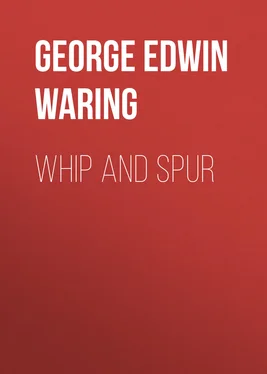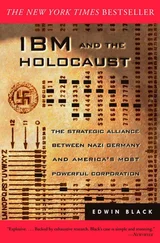George Edwin Waring - Whip and Spur
Здесь есть возможность читать онлайн «George Edwin Waring - Whip and Spur» — ознакомительный отрывок электронной книги совершенно бесплатно, а после прочтения отрывка купить полную версию. В некоторых случаях можно слушать аудио, скачать через торрент в формате fb2 и присутствует краткое содержание. Жанр: Биографии и Мемуары, История, foreign_edu, foreign_antique, foreign_prose, на английском языке. Описание произведения, (предисловие) а так же отзывы посетителей доступны на портале библиотеки ЛибКат.
- Название:Whip and Spur
- Автор:
- Жанр:
- Год:неизвестен
- ISBN:нет данных
- Рейтинг книги:4 / 5. Голосов: 1
-
Избранное:Добавить в избранное
- Отзывы:
-
Ваша оценка:
- 80
- 1
- 2
- 3
- 4
- 5
Whip and Spur: краткое содержание, описание и аннотация
Предлагаем к чтению аннотацию, описание, краткое содержание или предисловие (зависит от того, что написал сам автор книги «Whip and Spur»). Если вы не нашли необходимую информацию о книге — напишите в комментариях, мы постараемся отыскать её.
Whip and Spur — читать онлайн ознакомительный отрывок
Ниже представлен текст книги, разбитый по страницам. Система сохранения места последней прочитанной страницы, позволяет с удобством читать онлайн бесплатно книгу «Whip and Spur», без необходимости каждый раз заново искать на чём Вы остановились. Поставьте закладку, и сможете в любой момент перейти на страницу, на которой закончили чтение.
Интервал:
Закладка:
Sitting that evening at my tent door, opposite the spring, bragging, as the custom is, over the new purchase, it occurred to me that that stream of water and that bit of horse-flesh had some qualities alike; so I christened the latter “Roubie d’Eaux,” which was soon translated and shortened to “Ruby,”—a name henceforth familiar throughout the regiment.
To become my property was the only thing needed to make him perfect, for Ike was born in a racing stud in Kentucky, and had practised all the arts of the craft, up to the time when, being both jockey and “the stakes” in a race he rode, he was lost to a Missouri gentleman of fortune, and became a body-servant. He was once confidential:—
“Well, now, Colonel, you see, this is how it was: I hadn’t nothin’ ag’in my master,—he was a right nice man; but then, you see, he drinked, and I didn’t know what might become of me some time. Then, you see, I knowed this man was stiddy, an’ he’d jess done bought a yallar gal I kinder had a notion for, an’ so,—don’t ye see why?—well, the hoss could have won the race fast enough, but then, you see, my master,—well, he was a drinkin’ kind of a man, an’ I thought I might as well fix it. I knowed I was up for stakes, an’ that’s how I come to Missouri; I ain’t no Missouri man born , but that’s how it was.”
He had become a good body-servant without forgetting his stable training, and his horses bore testimony to his skill and fidelity. After going through the routine of a well-regulated stable, he gave each horse a half-hour’s stroking with the flat of his hands, brisk and invigorating; and the result was a more blooming condition and more vigorous health than is often seen in horses on a campaign. The best substitute that could be secured for a stable was a very heavy canvas blanket, covering the horse from his ears to his tail and down to his knees, water-proof and wind-proof. It was a standing entertainment with the less dignified members of the mess to invite attention to Ruby as he stood moping under this hideous housing. Certainly I never saw him thus without thinking that his time had at last come, and that he surely would never again be able to carry me creditably. Yet, as Ike’s devotion continued, he grew better and better, commanding daily more of the respect and admiration of all who knew him, and attaching himself to me more and more as we learned each other’s ways.
One never loves but one horse entirely, and so Ruby never quite filled Vixen’s place; but as a serviceable friend, he was all that could be desired. The unsupplied want of my life, that had made me restless and discontented, was now satisfied, and my duties became easy, and my pastimes (the principal times of South Missouri warfare) entirely agreeable.
It was no slight addition to these sources of contentment to feel that the command had at last awakened to a sense of its dereliction, and was fast reforming its ways. I had hardly owned Ruby for a fortnight before the old cheerfulness and alacrity returned to the regiment, and by the time we broke up our camp on the Roubie d’Eaux and went over to Lebanon for the shooting season, the entire organization was in a most satisfactory condition.
Our life in Lebanon was an episode of the war that we shall not soon forget. To the best of my knowledge and belief, after Price had retreated from Pea Ridge, the only organized forces of armed Rebels to be found north of the White River were local bands of jay-hawkers, whose rebellion was mainly directed against the laws of property, and the actuating motive of whose military movements was “nags.” The stealing of horses, with the consequent application of Lynch law, was all that the native male population had to keep them out of mischief, for weeks and weeks together. There was just enough of this sort of armed lawlessness to furnish us with a semblance of duty; not enough seriously to interrupt our more regular avocations.
Lebanon is on the high table-land of the Ozarks, in the heart of a country flowing with prairie-hens and wild turkeys, and bountifully productive of the more humdrum necessaries of life. Thanks to the fleeing of Rebel families, we found comfortable quarters without too severely oppressing those who had remained. What with moving the court-house away from the public square, leaving the space free for a parade, and substituting a garrison flag-staff for the town pump, we kept our men from rusting; and when, after a time, we had established a comfortable post-hospital and a commodious military prison, Lebanon was as complete and well-ordered a station as could be found in South Missouri. I had the questionable honor and the unquestionable comfort of holding its command from the end of January to the end of April,—three dreamy months, that seem now to have been passed in a shooting-lodge, under favorable auspices.
As a legacy of the “Hundred Days,” when the “Fourth Missouri” was the “Frémont Hussars,” we had an able-bodied and extremely well-selected regimental band, that soothed our over-tasked senses when we came in from our work in the fields, gathering where our enemies had sown, and (under the suspended game-laws of the State) shooting grouse and quail in the early spring.
Naturally, most of my official duties were such as could be performed by an extremely well-regulated adjutant; and I usually passed his busy half-hour (in private) with Ruby. There had been an impetuosity about the horse at the outset which it was desirable to quell, and I rode him regularly in a nicely fenced kitchen-garden, where, after he learned that fences are not always intended for leaping-bars, he fell slowly into the routine of the training-school, and easily acquired a perfect self-command and aplomb that enabled him, under all circumstances, to await his rider’s instructions.
I wish that less account had been made, in the writings of those whose horse-stories have preceded mine, of the specified feats of their animals. The rôle of a horse’s performances is necessarily limited, and it is probably impossible for a well-constituted mind to recite the simple story of his deeds without seeming to draw largely on the imagination. Consequently, an unexaggerated account of what Ruby actually did (and I cannot bring my mind to an embellishment of the truth) would hardly interest a public whose fancy has been thus pampered and spoiled. But for this, these pages could be filled with instances of his strength and agility that would almost tax belief. Suffice it to say that while, like most good high leapers, he would cover but a moderate breadth of water, he would get over anything reasonable in the shape of a fence that could be found about the town.
I was a heavy weight,—riding nearly two hundred pounds,—and necessarily rode with judgment. If there was a low place in a fence, we never chose a high one; but, at the same time, if there were no low places, we took the best we could find. Ruby seemed to know that the two of us were solid enough to break through any ordinary pile of rails, and what we could not jump over we jumped at . More than once did he carry away the top rail of a snake fence with his knees, and land fair and square on the other side; but it was a very high leap that made this necessary.
He would jump on to the porch of the quartermaster’s office (approached from the ground by four steps), and then jump over the hand-rail and land on the ground below again, almost wagging his tail with delight at the feat.
His ear was quicker than mine for the peeping of quail and for the drumming of grouse, and, in the absence of a good dog, there is no doubt that my pot (for which alone I have been said to hunt) was better filled by reason of his intelligence in the field, and because he would allow one to shoot from the saddle. The birds never mistook me for a sportsman until I was quite in among them, blazing away.
Читать дальшеИнтервал:
Закладка:
Похожие книги на «Whip and Spur»
Представляем Вашему вниманию похожие книги на «Whip and Spur» списком для выбора. Мы отобрали схожую по названию и смыслу литературу в надежде предоставить читателям больше вариантов отыскать новые, интересные, ещё непрочитанные произведения.
Обсуждение, отзывы о книге «Whip and Spur» и просто собственные мнения читателей. Оставьте ваши комментарии, напишите, что Вы думаете о произведении, его смысле или главных героях. Укажите что конкретно понравилось, а что нет, и почему Вы так считаете.












